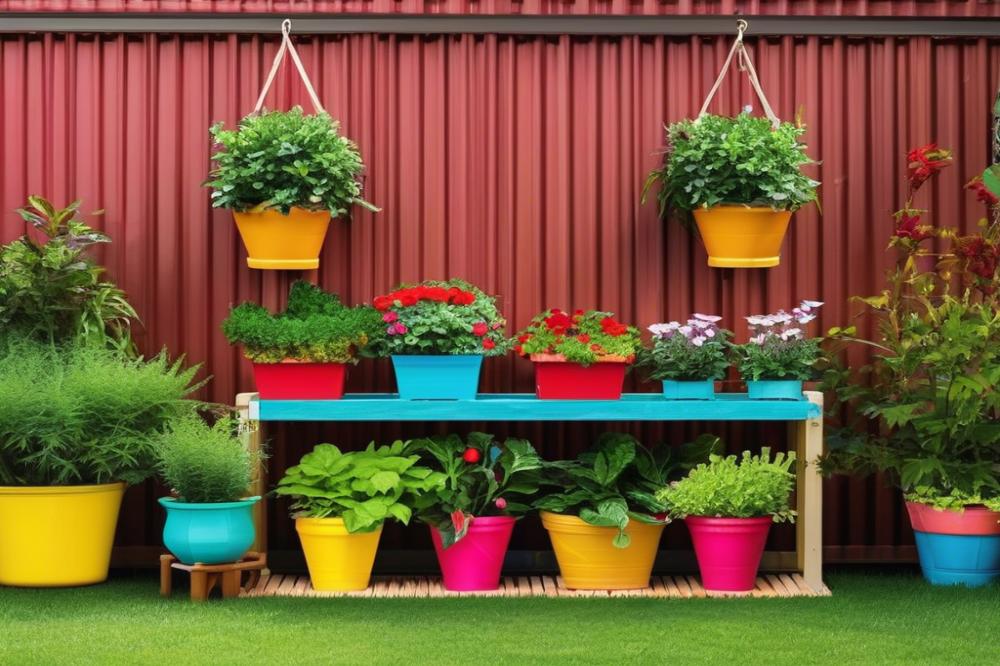Introduction
Container gardening has gained popularity among urban dwellers and gardening enthusiasts alike. This method offers flexibility and convenience, allowing individuals to grow plants in limited spaces. However, maintaining a healthy garden in containers comes with its challenges, particularly when it comes to managing pests. These unwelcome visitors can threaten the health of plants and diminish the joy of gardening.
Common pests such as aphids, spider mites, and whiteflies can quickly infest a container garden. Recognizing these invaders early is crucial. Regular monitoring of plants can help gardeners spot issues before they escalate. Ignoring the problem can lead to rapid spread and severe damage.
Adopting effective and eco-friendly pest control practices is essential. organic methods are a natural option that helps maintain soil health and the surrounding environment. Techniques like companion planting can deter harmful insects by attracting beneficial insects, creating a thriving ecosystem. Additionally, physical barriers, such as row covers, can offer protection against larger pests.
Gardeners can also utilize insect traps to monitor and reduce pest populations. Homemade sprays made from natural ingredients can serve as an effective deterrent without harming beneficial insects. Neem oil and diatomaceous earth are also popular choices, providing further options for organic pest management.
Ultimately, maintaining a vibrant container garden requires attention and care. Taking proactive measures through regular monitoring and using trusted methods can protect plants. This approach not only supports a sustainable garden but also enhances the gardening experience.
Understanding container garden pests
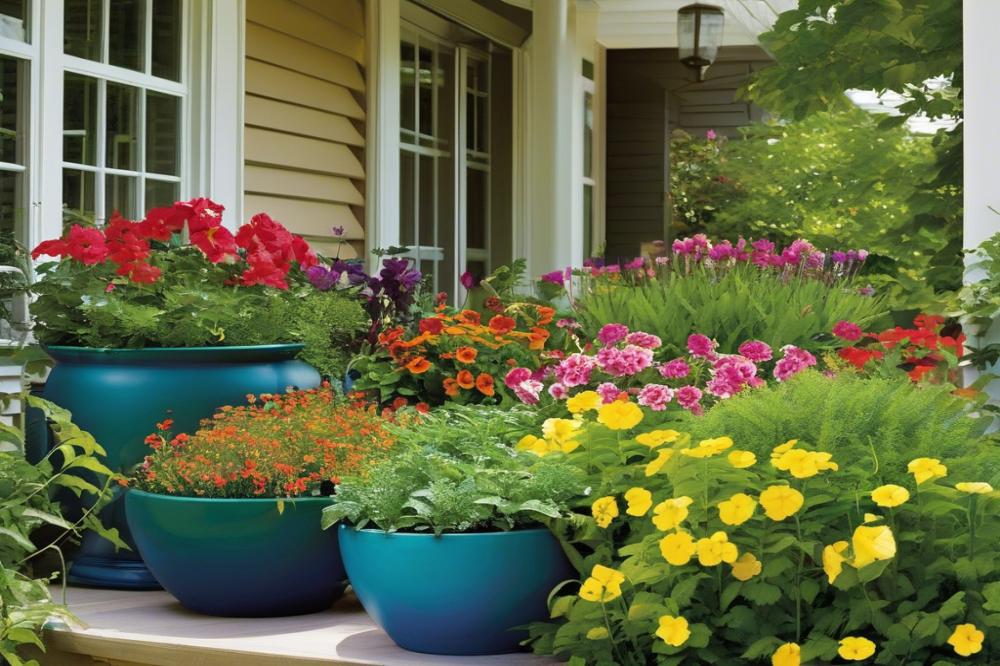

Container gardens can be vibrant and flourishing, but pests can turn this paradise into a struggle. Various insects can invade, affecting your plants’ health and growth. Common pests include aphids, spider mites, and whiteflies. Identifying these nuisances quickly helps in treating them effectively.
Pests can lead to more than just aesthetic damage. They often sap energy from plants, making them weak and vulnerable. Without prompt action, infested plants may develop stunted growth, yellowing leaves, or even die. Regular monitoring is essential to catch these issues before they escalate.
Productivity can drop significantly when pests invade your space. Healthy plants yield higher quantities of fruits and blooms. Addressing insect issues keeps your container garden thriving. Utilizing organic methods can be incredibly effective. Techniques like companion planting can confuse and deter some pests naturally.
Insect traps serve as practical tools in the battle against unwanted guests. They capture insects without harming the environment. Neem oil stands out as a powerful remedy, disrupting pest life cycles. Additionally, diatomaceous earth acts as a barrier, damaging the exoskeletons of insects that come into contact with it.
Encouraging beneficial insects, like ladybugs, can be a natural solution. These helpful creatures feast on many common pests, helping to restore balance in your garden. Implementing physical barriers, like row covers, provides further protection from potential invaders.
You can create homemade sprays using simple ingredients. For instance, a mix of soap and water can be sprayed directly on affected leaves. Maintaining soil health is also important. Plants in rich, nutrient-dense soil are better equipped to fend off pests.
Organic Methods for pest control
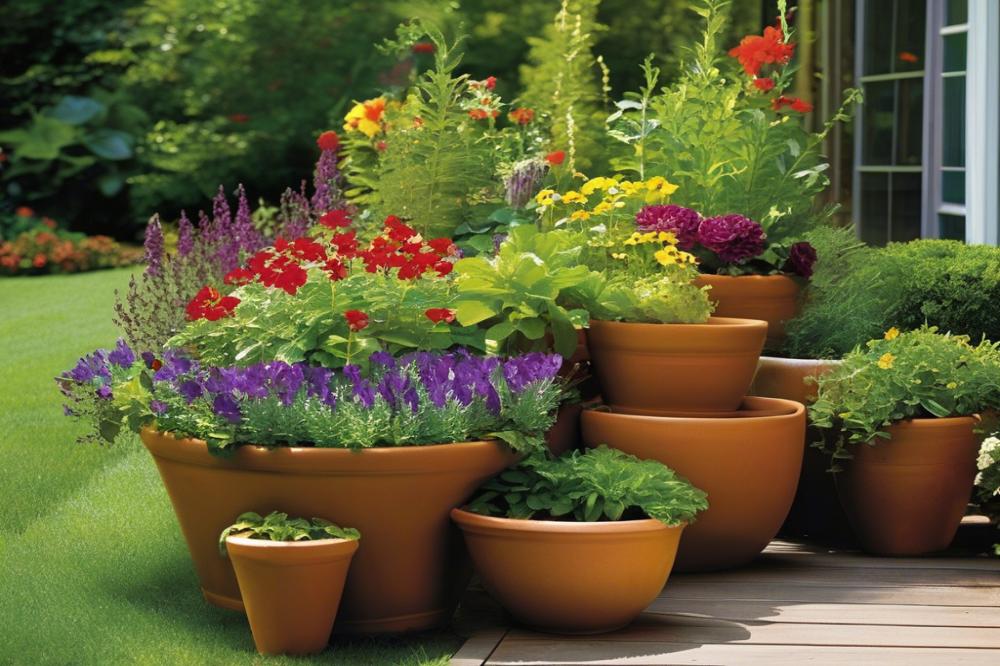

Container gardening can be a delightful hobby, but it often comes with challenges. Pests can ruin your plants quickly if you’re not careful. Thankfully, organic solutions can help. These methods focus on using natural ingredients and practices to keep your plants healthy.
Neem Oil and Its Effectiveness
One popular organic option is neem oil. Extracted from the seeds of the neem tree, this oil works as a natural pesticide. It disrupts the life cycle of pests without harming beneficial insects. Most gardeners appreciate its mildness and versatility. To use neem oil, mix it with water and spray it onto affected plants. This helps keep pests in check while maintaining soil health.
Diatomaceous Earth as a Pest Deterrent
Diatomaceous earth (DE) is another effective deterrent. This natural powder comes from the fossilized remains of tiny aquatic organisms. When sprinkled around plants, it creates a barrier. Pests that crawl over it get cut and dehydrated. Many gardeners find this method helpful for controlling soft-bodied insects like slugs and aphids.
Homemade Sprays Using Natural Ingredients
Creating your own pest sprays can also be satisfying. Combine ingredients like garlic, pepper, or soap to make an effective weapon against invaders. For instance, a mixture of crushed garlic and water can repel aphids and spider mites. Homemade sprays are often easy to apply and can be tailored to your specific garden needs. Make sure to test any mixture on a small part of the plant first. This step helps prevent damage to your delicate flowers or vegetables.
Beyond these methods, consider companion planting. Some plants repel pests naturally. For example, marigolds can deter nematodes, while basil can help keep flies away from tomatoes. You might also want to set up insect traps. These can capture unwanted visitors without harming beneficial insects. Regular monitoring of your plants is essential to catch any problems early. Look closely at leaves and stems for signs of trouble.
Using physical barriers can provide an extra layer of protection. Row covers or mesh can keep pests away while still allowing sunlight and water to reach your plants. This strategy works well, especially for young seedlings. Understanding these organic methods is crucial for maintaining your container garden effectively.
Companion Planting Strategies
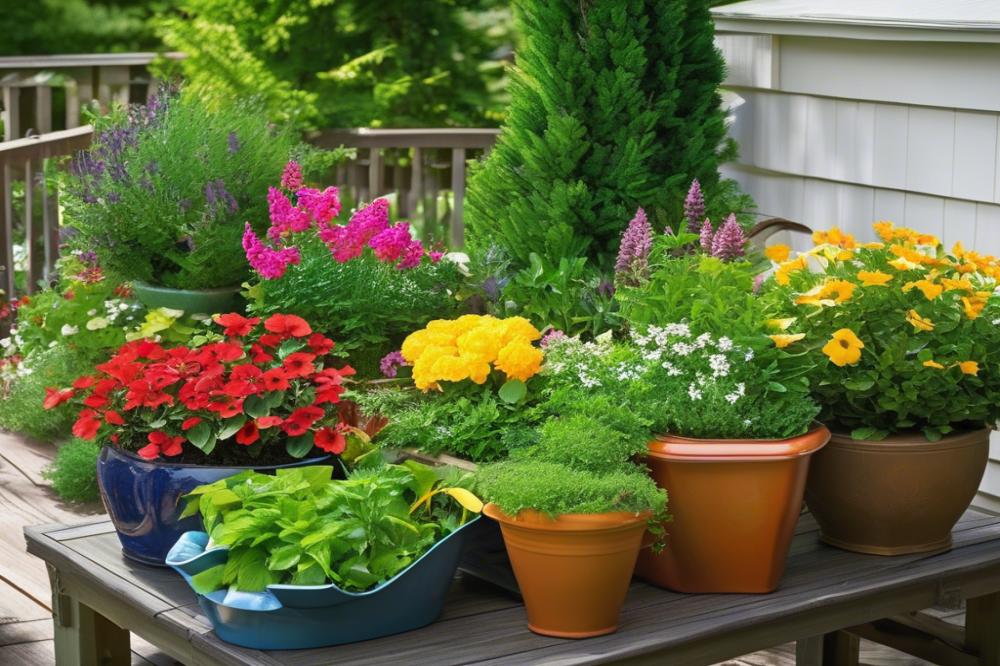

Companion planting is an effective organic method for managing pests in container gardens. This approach involves pairing certain plants together, allowing one to enhance the growth or pest resistance of another. By creating a diverse environment, gardeners can significantly reduce pest outbreaks. Benefits include natural pest deterrence and improved soil health, which helps plants thrive.
Some examples of beneficial plant pairings are marigolds and tomatoes. Marigolds emit odors that repel harmful insects like nematodes. Another excellent pairing is basil and peppers. Basil can ward off aphids and whiteflies, allowing peppers to flourish. These simple combinations can serve as a primary defense strategy against many common pests.
In addition to pest-resisting plants, a focus on biodiversity attracts beneficial insects. When various types of plants flourish, they form an inviting habitat for pollinators and predatory insects that feed on pests. Ladybugs and lacewings, for instance, thrive in diverse settings. They help combat aphids and other nuisances naturally, reducing the need for insect traps or chemical treatments.
Physical barriers can also enhance the benefits of companion planting. Using row covers or mesh can prevent pests from reaching vulnerable plants. Homemade sprays, like those made from garlic or soap, can serve as additional deterrents. Neem oil offers another layer of protection by disrupting pest life cycles.
Maintaining soil health plays a crucial role in creating a thriving container garden. Healthy soil leads to robust plants that are better able to resist pest attacks. Regular monitoring of your plants can help identify potential issues early. This proactive approach, paired with companion planting, often proves successful in pest management.
Utilizing diatomaceous earth is another way to fend off container garden pests. This natural powder damages insect exoskeletons upon contact, effectively acting as a barrier. While preventative measures are vital, understanding the relationships between plants can lead to innovative solutions. Companion planting is not just a practical strategy; it embodies a holistic approach to gardening.
Utilizing Insect Traps and Barriers
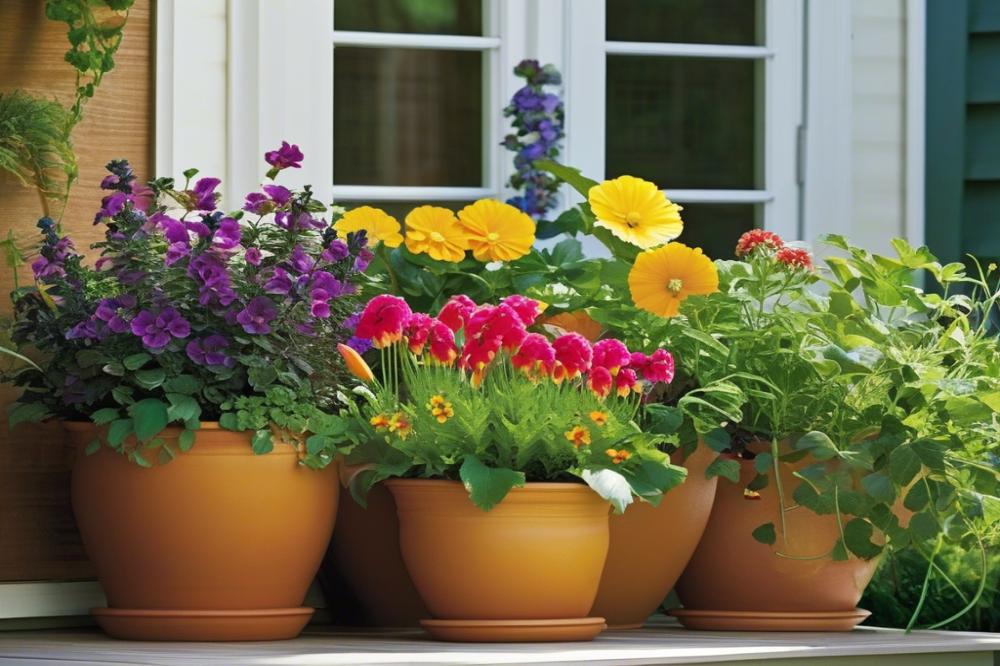

When managing pests, insect traps can be an effective tool in your container garden. Various types of traps are available, each serving a unique purpose. Sticky traps are one option. They use a simple adhesive surface to capture flying insects like aphids and whiteflies. Position these around the plants to catch pests before they become a larger problem.
Pheromone traps offer another solution. By attracting specific insects with scents, these traps help control unwanted populations. They target males of the species, preventing them from mating and reducing future infestations. These traps are particularly effective for pests like moths.
Physical Barriers
Physical barriers provide a straightforward method to protect plants. Row covers, for example, can be draped over your plants to obstruct insects from getting close. They allow sunlight and water to reach your plants while blocking pests, which is crucial for maintaining soil health.
Another option is using mesh netting around your containers. This technique prevents larger pests, such as birds and rabbits, from feasting on your hard work. Just remember to secure the edges well to avoid any gaps.
Advantages of Traps and Barriers
There are many benefits to combining traps and barriers in pest management. Both methods are often considered organic methods of maintaining your garden. They minimize the need for chemical sprays, such as neem oil, which is useful but may not always be suitable for every situation.
Utilizing beneficial insects is an additional strategy. Ladybugs and lacewings, for instance, can help keep pest numbers down. By focusing on a mix of methods, control becomes more effective. Regular monitoring helps identify any issues early. Make a habit of checking traps and inspecting your plants for any signs of trouble.
Homemade sprays can complement the use of traps and barriers. Solutions made from common kitchen ingredients can deter pests without harming the environment. Meanwhile, diatomaceous earth works wonders as a powder sprinkled on the soil. This natural option not only controls pests but also supports overall soil health.
Encouraging Beneficial Insects
Creating a healthy container garden involves more than merely growing plants. It’s essential to welcome beneficial insects into your space. These insects play a crucial role in controlling pests and pollinating flowers. Identifying them is the first step. Ladybugs, lacewings, and parasitic wasps are excellent allies against unwanted visitors. Not only do they combat pests, but they also support the overall health of your garden.
Attracting these helpful creatures can be achieved through simple strategies. Companion planting is one effective method. By placing flowers like marigolds or nasturtiums near your vegetables, you can draw in beneficial insects. These plants not only beautify your garden but also serve as a beacon for ladybugs and other predators. Additionally, consider using physical barriers, such as mesh screens or row covers. These barriers can protect your plants while allowing beneficial insects to thrive.
Another strategy involves fostering soil health. The health of your soil directly impacts the types of insects that visit your garden. By composting and avoiding pesticides, you create a welcoming environment for beneficial species. Regular monitoring of your plants makes it easier to spot both pests and their allies. This awareness allows you to take action quickly when needed.
Some gardeners find success with insect traps containing attractants. These traps capture unwanted pests while leaving beneficial insects unscathed. Homemade sprays made from neem oil can also be part of your organic toolkit. They deter pests without harming the beneficial ones in your garden. diatomaceous earth can provide another layer of pest control, working physically rather than chemically.
Pollinators, such as bees and butterflies, are not just pretty visitors. They are essential for fruit and vegetable production. Supporting these insects should be a priority in your container gardening efforts. By understanding the roles each insect plays, you can create a thriving ecosystem right outside your door. Ultimately, embracing beneficial insects leads to a more resilient and productive garden.
Maintaining Soil Health
Healthy soil is essential for any container garden. Pests are less likely to invade well-nourished plants. When plants are thriving, they can resist various challenges, including infestations. Strong roots and robust growth make it hard for pests to take hold.
Regular monitoring is key to maintaining soil quality. Check your containers frequently for signs of nutrient deficiencies or soil degradation. Uneven watering can lead to compacted soil, which inhibits root growth. Aeration helps in maintaining the right structure for roots to expand.
Best Practices for Soil Health
Using high-quality organic methods is vital. Opt for potting mixes that include organic matter. These mixes often provide a range of nutrients that are beneficial for plants. Regularly adding compost can enhance the nutrient profile of your soil. Compost not only enriches but also helps retain moisture, which is crucial during dry spells.
Rotate your crops and introduce companion planting. Some plants naturally repel pests or attract beneficial insects. This strategy keeps the ecosystem within your container garden balanced and healthy. The diversity of plants creates a habitat where pests find it challenging to dwell.
Incorporating insect traps can also be effective. These traps can capture unwanted visitors before they cause damage. Physical barriers like nets or row covers minimize open access to your plants. They are simple yet beneficial tools for pest management.
The Role of Nutrients
Nutrients play a vital role in strengthening plant immune systems. For example, adding diatomaceous earth can help deter pests while enriching the soil. This natural substance is safe and can be applied in a thin layer on the soil surface. When used correctly, neem oil serves as another safe option, offering both pest control and a nourishing treatment for plants.
Homemade sprays made from kitchen ingredients can also boost soil health. Simple mixtures of garlic or pepper can be effective against pests. These sprays, along with organic methods, create a layered approach to pest resistance.
Lastly, promote the presence of beneficial insects. Ladybugs and lacewings can keep pest populations in check. By nurturing a diverse environment, you create a sustainable balance in your container garden. Keeping the soil in check directly contributes to healthier plants.
Regular Monitoring and Maintenance
Keeping an eye on your container garden is crucial. Regular monitoring allows you to spot issues before they escalate. Look for unusual signs such as discolored leaves, wilting plants, or tiny insects. A quick daily check can save your plants from major damage.
Early detection is key to effective pest control. If you notice pests early, you can take swift action. Delaying treatment often leads to bigger problems, which can be costly and time-consuming. For instance, a small aphid infestation can be handled easily, but if left unchecked, it can devastate your plants.
Establishing a routine is beneficial for long-term success. Set aside specific times each week for thorough inspections. Include checking the soil health and ensuring proper drainage. This creates a consistent care routine that keeps pests at bay.
Consider using organic methods to combat any issues. Homemade sprays made from natural ingredients can be effective. Neem oil is a popular choice due to its pest-repelling properties. Diatomaceous earth is another option; it can disrupt the life cycle of many unwanted insects.
In addition to sprays, you may want to implement physical barriers. These can include row covers or netting to prevent pests from reaching your plants. Companion planting can also work wonders, as certain plants naturally deter pests while benefiting neighboring plants.
Insect traps are another strategy to manage pests. They can effectively catch unwanted visitors while preserving the health of your garden. Beneficial insects, such as ladybugs and lacewings, can help keep pests under control, so attracting them should be part of your strategy.
Pest management requires consistent effort. Regular monitoring combined with timely intervention will yield the best results. Stay alert, treat the signs of trouble promptly, and maintain a healthy garden environment.
Key Takeaways for Pest Management
Effective pest control in container gardens requires a thoughtful approach. Integrated pest management combines multiple strategies to keep plants healthy and thriving. This means using a mix of techniques rather than relying on one method. For instance, introducing beneficial insects can help maintain a balance in your garden.
Gardening enthusiasts should also consider organic methods. These are often safer for both humans and the environment. Using these techniques can promote healthier plants while minimizing damage from unwanted pests. Additionally, keeping a close eye on your plants helps you catch pests early before they spread.
Companion planting is another valuable tool in your arsenal. By pairing plants that support each other, you can repel certain pests naturally. This approach not only nurtures your garden’s health but also enhances its visual appeal.
In summary, remember that a successful container garden is built on sustainable practices. Approach pest management with flexibility and creativity. A mix of strategies will lead to long-term success. By making small changes now, gardeners can create a thriving space that continues to flourish season after season. Embrace these tips, and watch your container garden thrive without the burden of pests.

